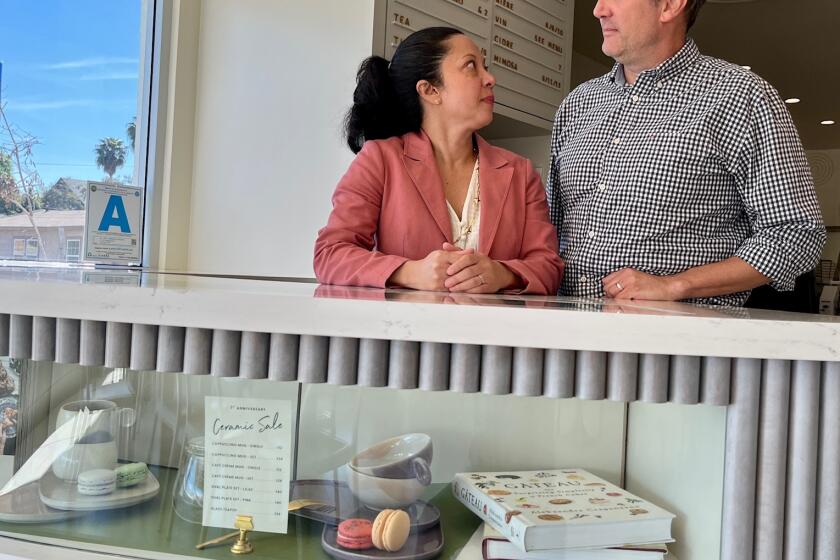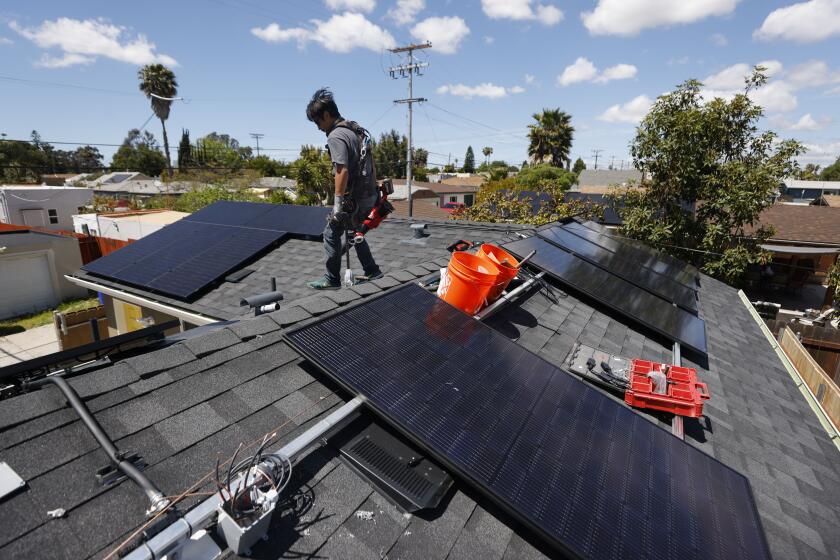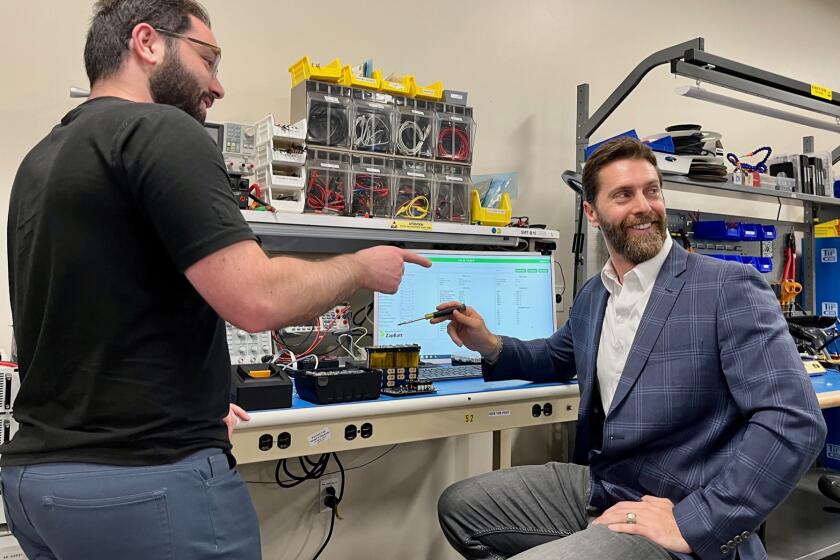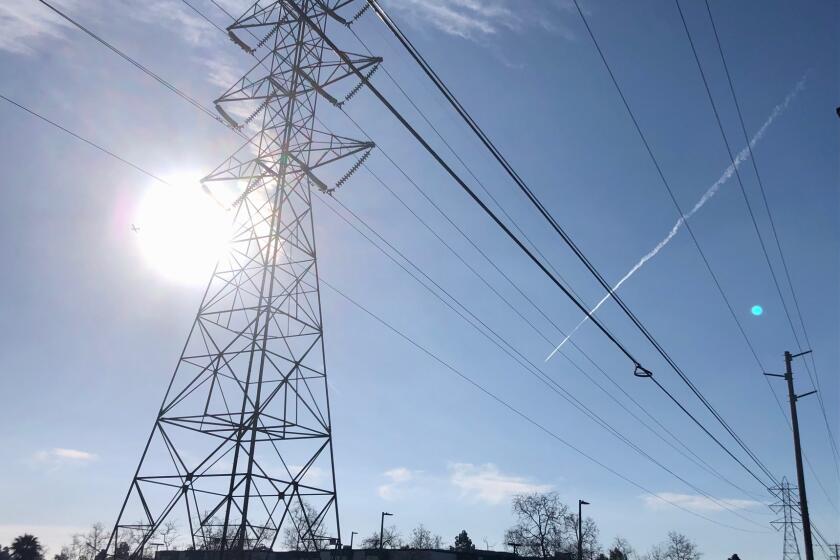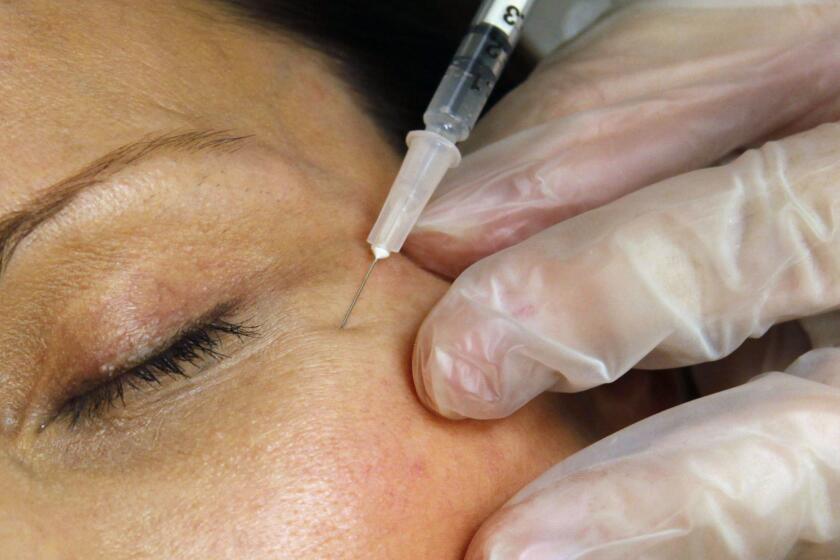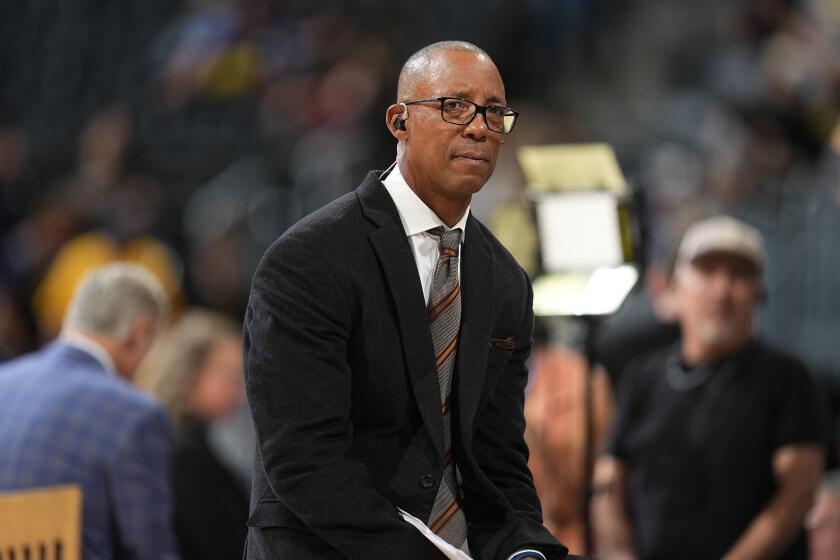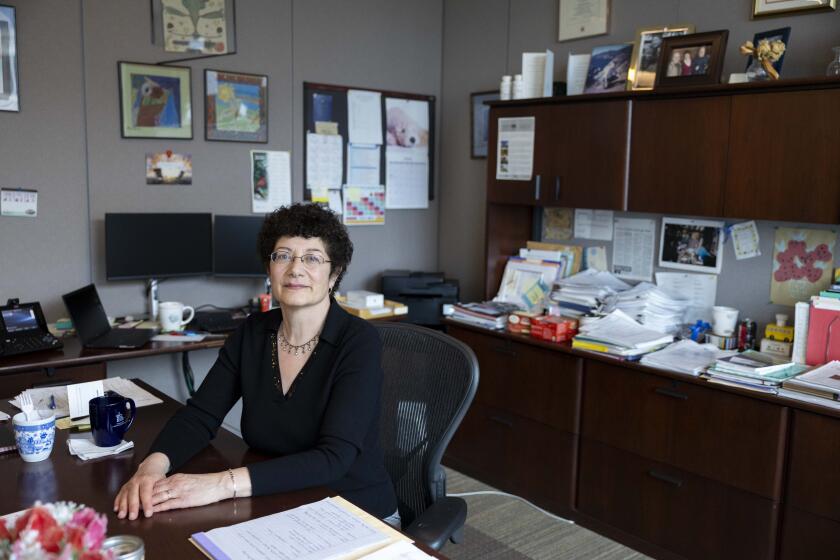Masks begin to proliferate as San Diegans adopt new coronavirus measures
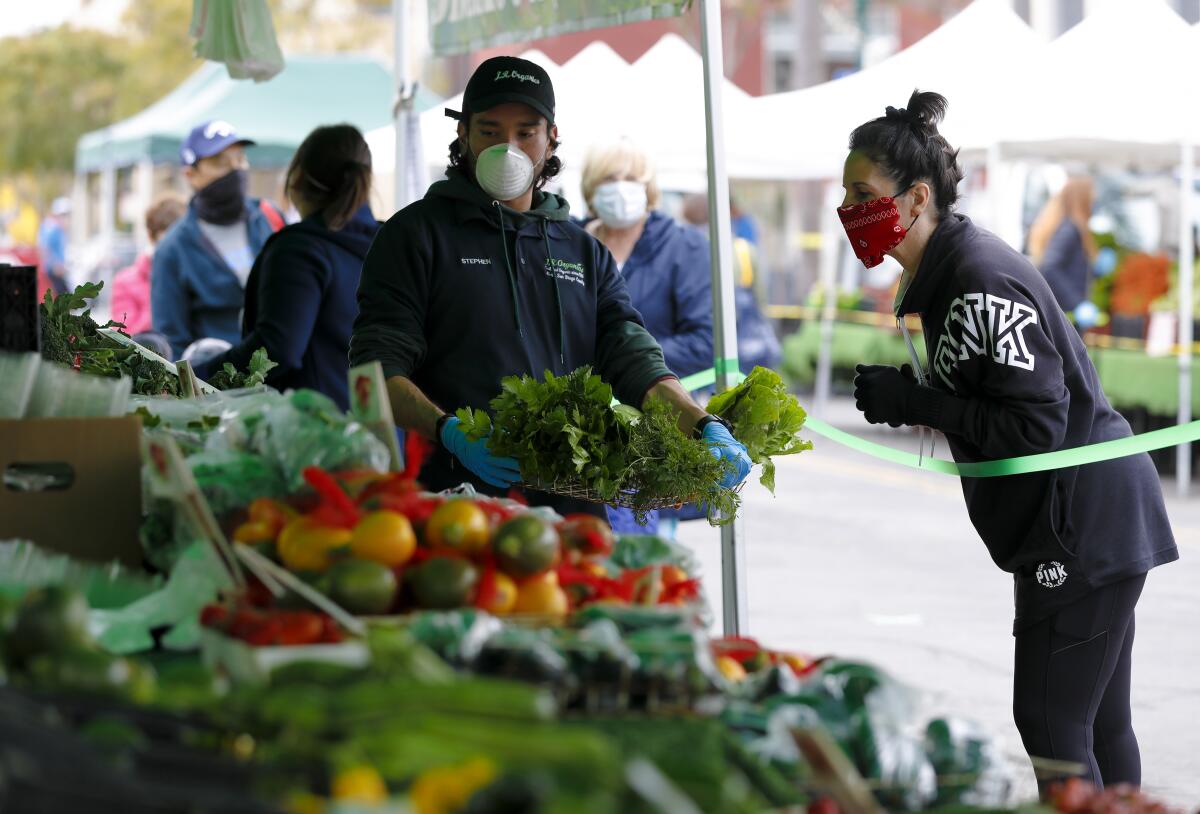
County launches online personal pledge campaign as workers and residents race to find or create face coverings
The face of the coronavirus in San Diego has evolved: It’s now wearing a mask.
Less than 48 hours after San Diego County strongly encouraged the general public to wear face coverings when venturing outdoors, an increasing number of residents from one end of county to the other could be seen donning a variety of masks Saturday.
They wore them while grocery shopping and running essential errands and, to a lesser extent, while exercising, in the hopes that covering their mouths and noses can help protect themselves and others from contracting COVID-19.
“I feel a little bit safer wearing it,” said Tammy Campbell of Fletcher Hills, who started wearing a home-made mask Thursday. “It’s a precautionary measure that everybody should be taking.”
In fact, the county is asking every resident to make a public pledge to do just that.
On Saturday, county officials launched a social media campaign, asking people to pledge to stay home, wear face coverings and practice social distancing. The effort includes a website, coronavirus-sd.com/pledge, where San Diegans can formalize their commitment and then share it with friends and followers.
“Our success as a region is, in large part, dependent on every individual San Diegan making an individual commitment to do their part, not just to protect themselves but to protect others,” said county Supervisor Nathan Fletcher.
The campaign comes as county officials reported another virus-related death, an increase of one from the previous day, bringing total area deaths to 18.
County Public Health Officer Dr. Wilma Wooten said the latest victim was a man in his early 70s.
The number of people testing positive for the virus increased by 97, bringing the total to 1,209, she reported Saturday.
In a noon news conference, Gov. Gavin Newsom addressed the lack of testing capabilities in the state and promised at least a five-fold increase in daily tests over the next few weeks.
Newsom added that the state has formed a partnership with UC San Diego and UC Davis to “create a minimum of five to seven hubs” to “significantly increase our testing capacity.” The hubs will be based up and down the state, he said.
As the number of cases have increased each day, the county and state have enacted increasingly stricter measures in an effort to curb the disease’s spread.
Following weeks of patchwork beach and park closures, by Saturday pretty much all recreational spaces had been shuttered.
Joggers, walkers and cyclists were out in force from Oceanside to Del Mar in the early afternoon, but when it came to mask-wearing, the vast majority seemed to draw the line at exercising.
People seemed to be heeding orders to stay off the beach and out of the water. There were no surfers in sight, and miles of beaches were empty.
On Friday evening, however, sheriff’s deputies in North County beach cities issued 22 citations to people who were said to be in violation of the county’s and state’s new social distancing policies.
The ticketing effort was conducted between 5 p.m. and midnight in Encinitas, Solana Beach and Del Mar, with neighborhoods selected based on community member complaints.
Meanwhile, essential businesses scrambled to obey the county’s new mandate — which went into effect at midnight Friday — requiring employees to wear face coverings when on the job in grocery stores, convenience stores, pharmacy and drug stores, gas stations and restaurants.
With masks across the country already in short supply, that meant the Albertson’s grocery store on Lake Murray Boulevard had to race to find a sufficient number to hand out to its 100 or so employees.
“It’s definitely a challenge to make adjustments, especially when you’re given 24 to 48 hours to adjust,” said Melissa Hill, Albertson’s director of public affairs and government relations. The company was already in the process of ordering millions of disposable masks for employees at its 2,200 stores around the country, Hill said, “but the timing and implementation of the San Diego County mandate was so quick that our masks have not arrived (yet), so we’ve had to be creative.”
The store turned to Leticia Rangel for help. The grocery’s bookkeeper, who happens to have a kinetic talent as a seamstress, started her work days Friday and Saturday at 4 a.m., stitching up washable fabric masks for her colleagues from material she bought at neighboring stores. She said Albertson’s will reimburse her.
“I’m just trying to help my co-workers,” Rangel said as she manned her personal sewing machine in the back office of the store. “I said, ‘You know what? I know how to sew. Bring it to me and I will do it for everybody.’”
Rangel, who said it takes about four to five minutes to make a covering, churned out 27 masks Friday. Asked mid-morning how many she made Saturday, Rangel waved her hand. “I lost count,” she said.
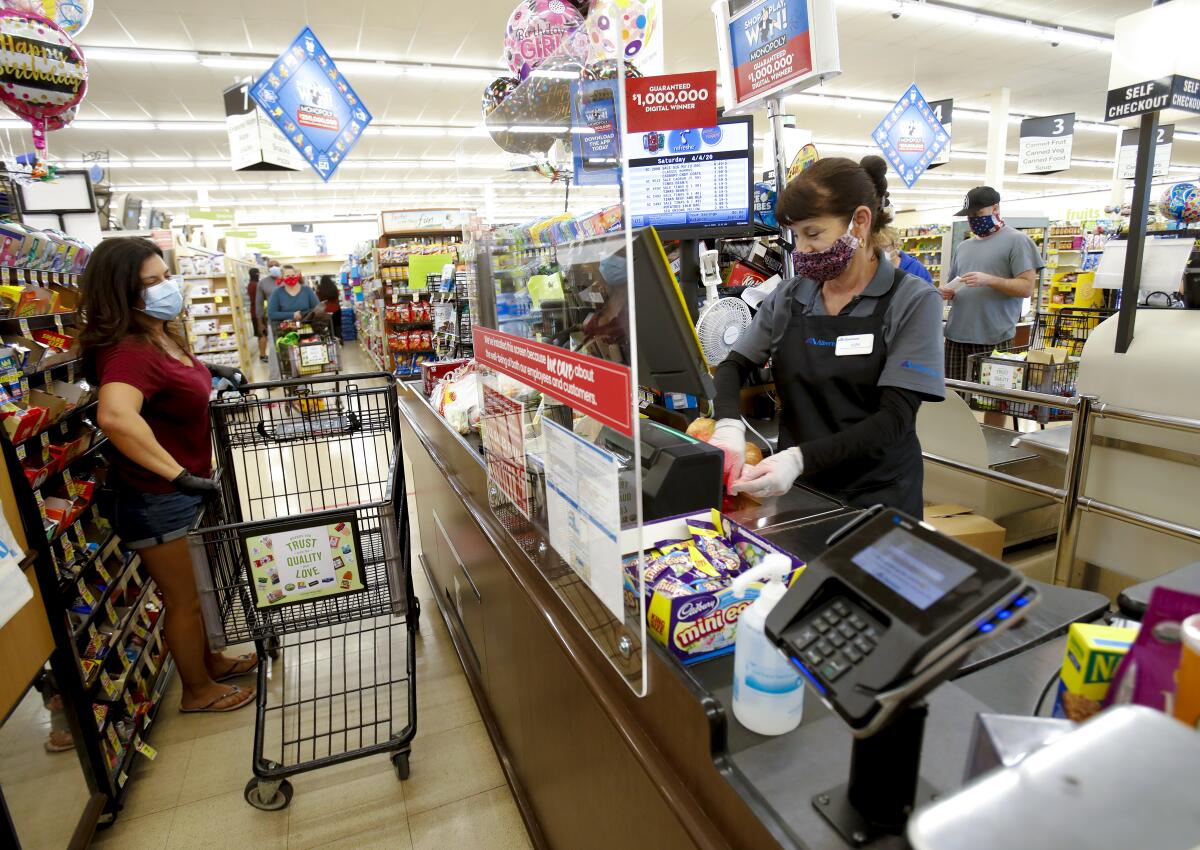
Maribel Sanchez, a cashier, said since she’s “a little claustrophobic,” wearing the mask all day at work can be challenging. “I’ve been doing yoga so I’ve been focusing on my breathing a lot,” she said. “It is what it is. It’s an adjustment.”
More than half the customers at the store late Saturday morning wore masks, in a scene that played out at stores across the county. Hill said Albertson’s is not turning away customers who refrain from covering their faces. “We’re not the enforcers,” Hill said. “Law enforcement is the enforcers.”
James Guodace, a 29-year-old facilities manager from Fletcher Hills, did not wear a mask while grocery shopping but said it wasn’t because he’s refusing to. “If I could find one, I would wear one,” the married father-of-two said. “I’m going next door to Rite Aid right now. Hopefully, I can find one there.”
Following U.S. Centers for Disease Control and Prevention social distancing guidelines, the Lake Murray Albertson’s adjusted its maximum occupancy to 100 customers.
But some customers remain anxious, said Gina Springer of San Carlos, who started wearing a mask Friday. “I saw a woman on another aisle get mad if anyone else came in that aisle,” Springer said. “You’re not the only one in the store. We’re all trying to do this together. We’re all stuck in the same situation. We need to be patient with each other.”
In downtown San Diego, the open-air Little Italy Mercato Certified Farmers Market reopened after being canceled for two of the last three Saturdays because of the COVID-19 outbreak.
About 20 fresh food devotees formed a long line — each person dutifully standing behind green tape 6 feet apart — to enter when the farmers market opened at 8 a.m. Robb Dubre, a 48-year-old resident of Little Italy, got there first. Like many in the queue, he was wearing a mask.
“I wanted to get here early before any crowds,” he said. “I usually visit certain vendors. They see me every week, we’ve created a relationship with them. They know what you like.”
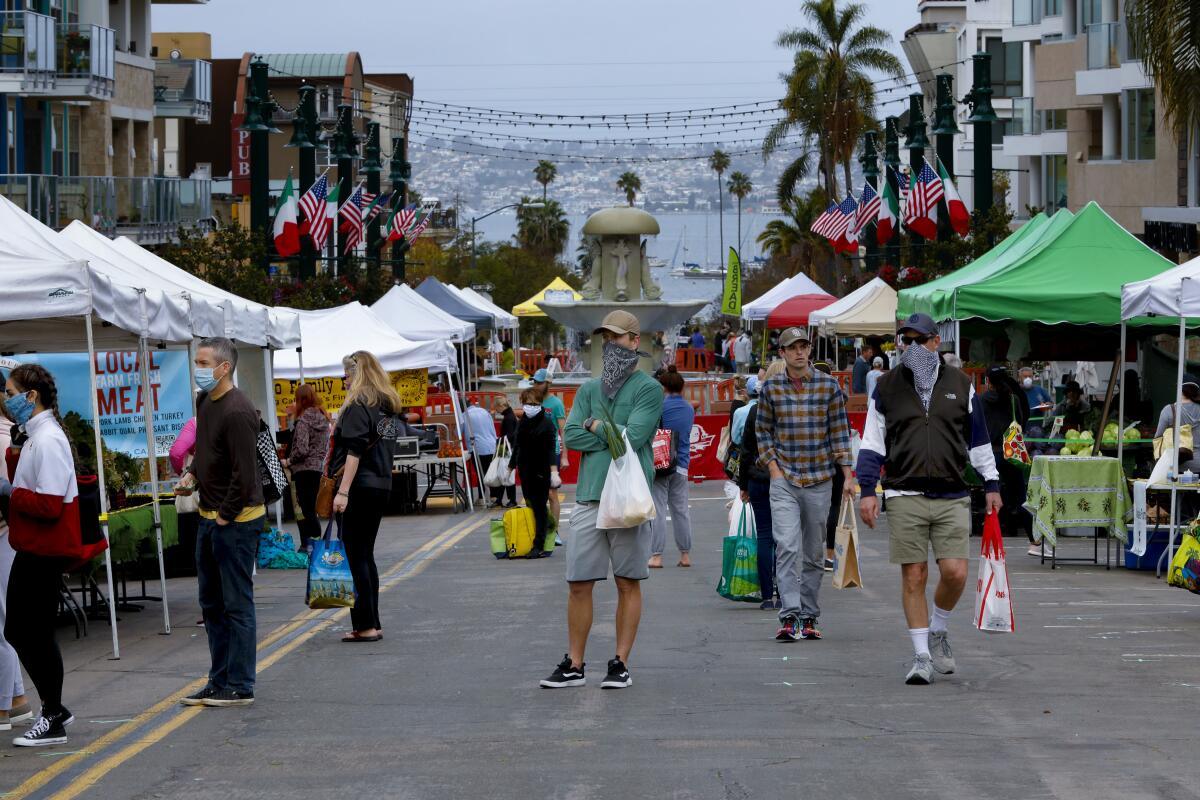
The market returned on a limited basis, adhering to a host of strict city of San Diego rules that officials scrupulously followed.
Farm stands were spread out at least 15 feet from each other. Entry to the market was restricted to no more than 50 people allowed in along the State Street block and no more than 30 on the piazza. Customers could not squeeze the produce and items could not be touched before purchase. Instead, “point and purchase” rules were in force, with customers pointing to what they wanted and farmers bagging it for them.
“We don’t want people lingering, to chit-chat,” said Catt Fields-White, manager of the Little Italy Mercato and director of San Diego Markets. “This is very counter-intuitive to the way we usually run. Right now, the priority is simply providing a safe place for people to grocery shop and get nutrient-dense food.”
Sven Merten, co-owner of Honeymoon Homestead in Jamul, said the effects of the pandemic came at a terrible time for his business that sells bread, kale and eggs.
“We were just finally breaking even right when this hit,” Merten said. “Our sales were finally coming up to where we could pay for everything ... We’d go out of business without the (area’s farmers) markets, for sure.”
Fields-White said San Diego has the largest number of small farms of any county in the nation, and they could be hit hard by the outbreak.
“They have crops that are coming out of the ground that are not going to be edible or saleable in two weeks,” she said. “So if they can’t sell them now, they’re going to have to plow them under.”
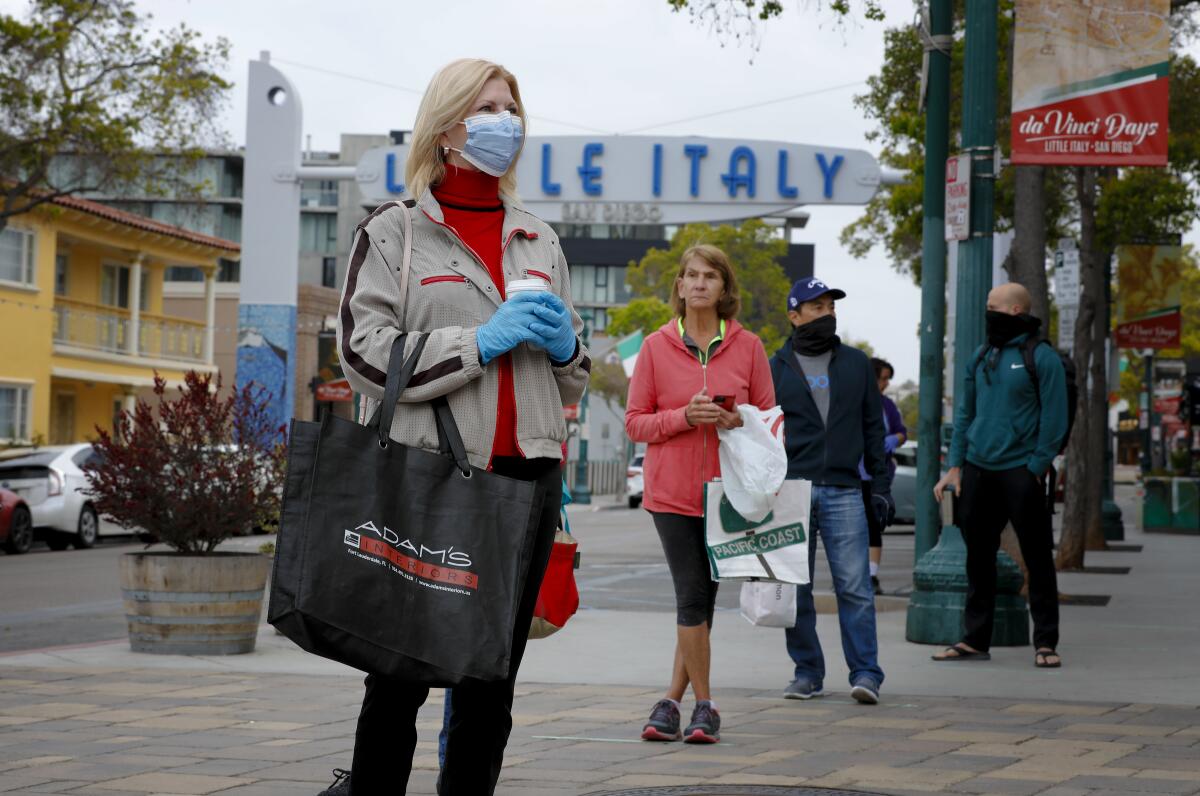
But with many outdoor gatherings closed due to COVID-19 restrictions, why should farmers markets remain open?
Fields-White said with current rules in place, aisles at farmers markets are wider than at supermarkets and the food has been touched by fewer people. In addition, there is no supermarket in Little Italy where its residents can buy their groceries.
“We’re taking it one week at a time,” she said, adding that she was encouraged by how smoothly things went Saturday.
Get Essential San Diego, weekday mornings
Get top headlines from the Union-Tribune in your inbox weekday mornings, including top news, local, sports, business, entertainment and opinion.
You may occasionally receive promotional content from the San Diego Union-Tribune.



